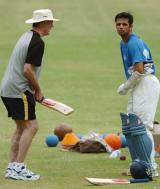
|

Are the winds of change blowing through Indian cricket?
© Getty Images
|
|
On June 20, 1996, Rahul Dravid was handed a Test cap at Lord's, in the second Test against England, after Sanjay Manjrekar twisted his ankle in the first. Since then he has not looked back, and has played a record 91 straight Tests. Manjrekar played just two more Tests in his life. On Thursday, an injury to Sourav Ganguly precipitated Dravid's appointment as captain of the Indian team for two back-to-back series - his longest stint to date - and signals that the end of the road is near for Ganguly, almost certainly as captain, and most likely as player too.
That the selectors chose to give Dravid two tours at the helm, instead of the customary one, is the strongest sign yet that the tide has turned against Ganguly. When the current season began, and India were headed to Sri Lanka with Ganguly's participation in doubt thanks to an ICC ban for slow over rates, Dravid was made captain on a stop-gap basis. He did a decent job, both with the bat and as leader, even as the team slumped to defeat. When the team came back from Sri Lanka, Ganguly was reinstated captain for the tour of Zimbabwe, and Dravid relegated to behind-the-scenes with a quiet, "Thank you for your services".
Dravid won't let on, but he was furious at the decision of the board. It became increasingly clear that he was not interested in the captaincy on an ad hoc basis. He had no time to implement his ideas, and more often than not was left carrying the can when it came to answering tough questions about things going wrong. Dravid has not granted a single interview since that period, but seasoned followers of his line of thinking would tell you that two things changed irrevocably after India's return from Sri Lanka. Firstly, Dravid would not accept the captaincy as a stand-in, merely keeping the seat warm for Ganguly. Second, if Ganguly were named captain for a long duration - till the 2007 World Cup as some sections demanded - Dravid would step down from the vice-captaincy and give up all ambitions of leading India.
Not long ago, in an interview to The Wisden Cricketer, Dravid said, "I have been vice-captain for a few years, and that means you are, in some sense, prepared to be captain. But to be honest, captaincy is not the be all and end all of things. If at some stage the captaincy came along, well and good. I won't lose a night's sleep over it. I haven't so far." He meant that in a different context; now, taking over the reins with the team struggling and close to the bottom of the ladder, he may well lose some sleep. For it would be a mistake to view this appointment as a victory for Dravid over Ganguly, or Chappell over Ganguly. It was simply the only way forward. It's not merely important to do the right thing, but to do it at the right time.
Greg Chappell has been entrusted with rebuilding a team that has been on a downward spiral for more than a year. He was appointed with the responsibility of bringing a long-term vision and faithfully implementing it. And for a variety of reasons this has not been possible in the short time he has been coach. Chappell has not got the players he wanted, he has not had a free enough hand to reward certain attitudes or punish others, and his captain had not bought into the vision enough to give it a solid chance of working.
And make no mistake, while the Ganguly-Chappell relationship has been downright confrontational, the Ganguly-John Wright one was far from rosy. The two barely sang from the same hymn sheet, but Wright accepted what he had to work with and got on with the job. With the appointment of Dravid India now have a chance for coach, captain and team to work together, getting to the root of the problems afflicting the team and sorting them out in time for the 2007 World Cup.
The mantra all season has been "take India to the next level". With young talent busting at the gut for a place in the side - the Challenger Series threw up more than one cricketer with definite promise and reinforced the stature of others on the fringes - there's no reason why India cannot make it to the next level.
But to believe that Dravid's appointment, as Chappell's earlier, will cause the team to transform itself overnight into the New Australia, is silly. Dravid is patient, hard-working, dedicated and committed to excellence. But he is also someone who won't find it as easy to handle the problem characters in the team as Ganguly. He won't bring the same in-your-face aggro to the field. He certainly won't come to the job with the unequivocal support of the powers-that-are in the BCCI that Ganguly did. What Ganguly did for this team - not just 76 ODI and 21 Test wins - is something perhaps Dravid could not have, had he been appointed captain five years ago. Today, Ganguly cannot do what Dravid can. The wheel has turned, and Ganguly's time is over.
For all he has contributed to this team, Ganguly deserved a better farewell - if indeed that's what this is - than being abruptly dropped. He deserved to walk away into the sunset, head held high, not be nudged out, first by coach, then the media, the public, and finally the selectors. But then again, with his batting, his behaviour and his almost stubborn refusal to let go, he barely gave anyone a chance to do any better by him.
Anand Vasu is assistant editor of Cricinfo
